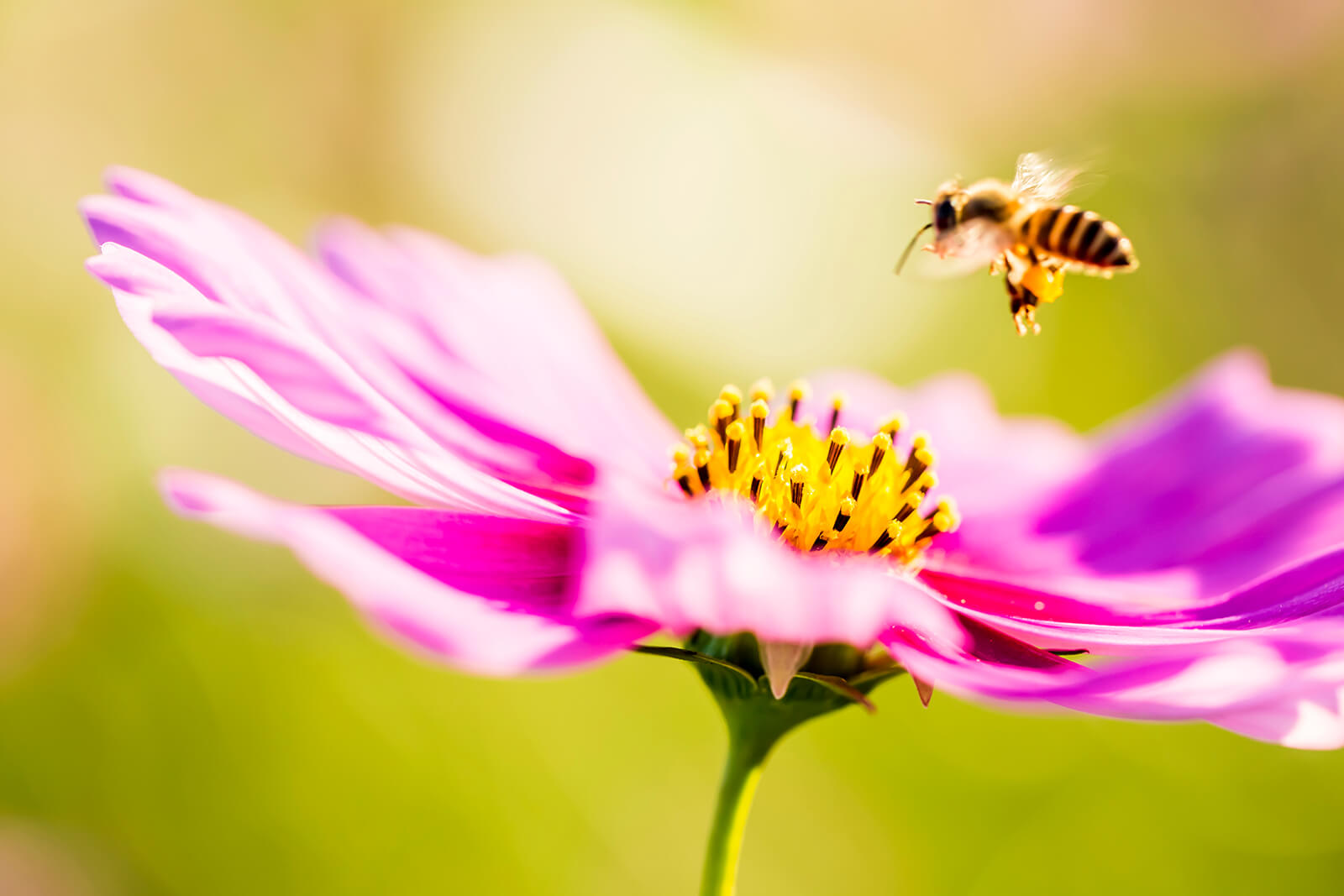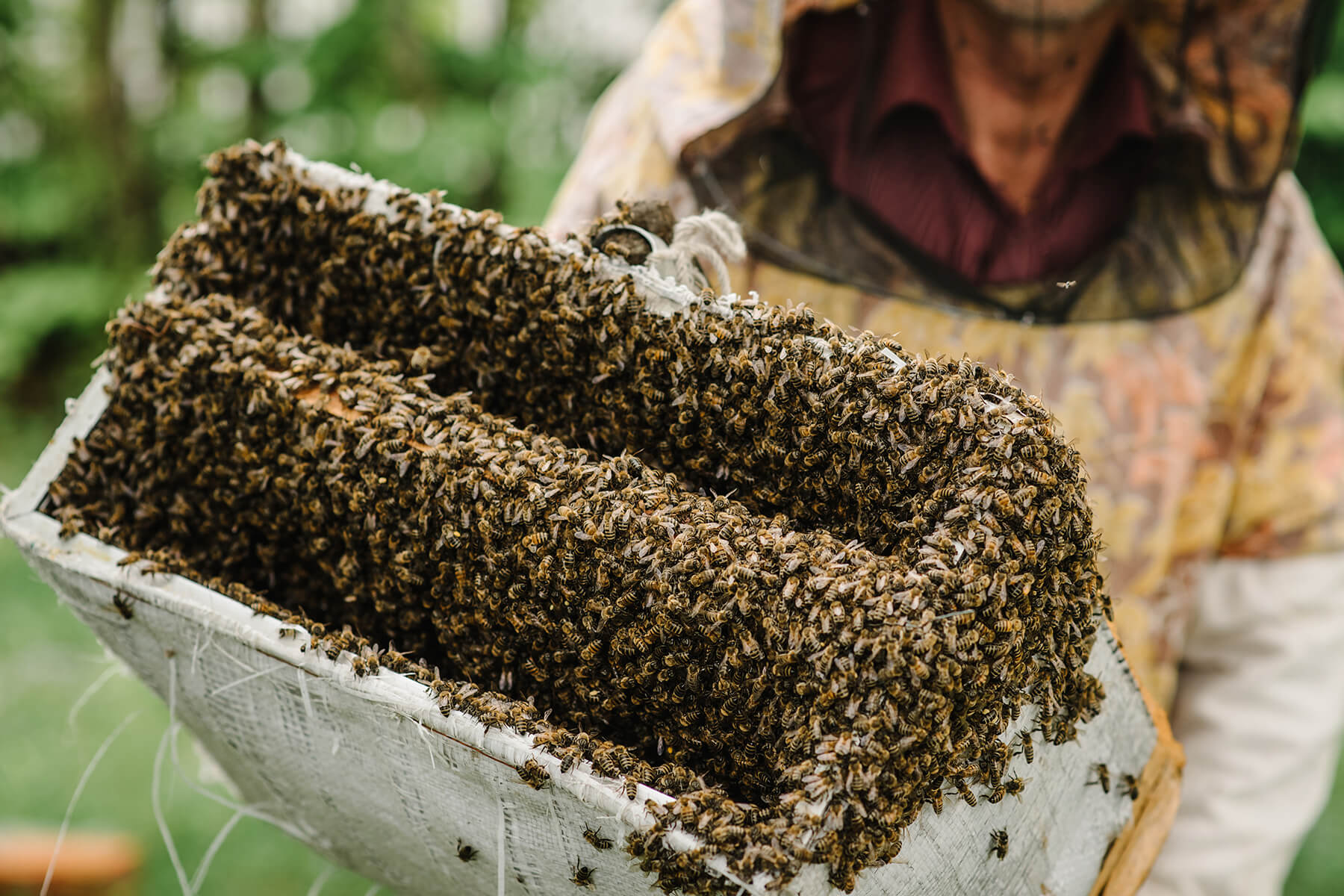June 8, 2022

How to support bees in your garden
By Gail Pope
Journalism Intern, Landscape Ontario
Beekeepers across Canada are reporting bee colony losses of up to 90 per cent this year, a massive increase from the typical loss of 30 per cent. Campaigns to help bees have been buzzing around for many years, but the problem continues to escalate.
Pesticide use, intense weather conditions, viruses and diseases are contributing to a sharp decline in bee populations. The newest threat: the Varroa mite.
The Varroa mite has been around for many years, but beekeepers are reporting an increase in population.
The mites live inside bees and prey on them for their bodily fluids. This makes bees much weaker to the point where many can no longer fly. If left untreated, the end result can mean the death of an entire bee colony.
However, the president of the Ontario Beekeepers’ Association, Bernie Wiehle, explains how the main culprit in bee decline is a mystery.
“We know that mites are a factor, but even for me, I had yards where there were substantially high losses and another with low losses and I did the exact same thing,” Wiehlie said.

“Clovers are always good, but there are so many to choose from,” Wiehlie said.
Many plants will bring bees to a backyard, but their favourite colours are yellow and orange. Trees are also a bee’s favourite in early spring.
Another way to help bees is to stop using harmful pesticides. Wiehle recommends considering if you really need to use those products and to read the instructions carefully before use.
Bees also love weeds. No Mow May is an initiative that encourages homeowners to stop cutting weeds since they are a great source of pollen for bees.
“Bees don’t distinguish between weeds and flowers,” Wiehle said. “And weeds really aren’t a problem to leave in a garden.”
With the hard hit from bee losses this year, it is also great to support local beekeepers in your area. Here is a list of Ontario-based beekeepers' businesses.
Most importantly, Wiehle encourages any beekeeper to ensure they take good care of their hives to prevent the spread of viruses and Verroa mites.
“A hobby beekeeper that isn’t doing what they are supposed to be doing can really affect neighbouring beekeepers,” Wiehle explained. “Diseases and pests can spread really easily so we ask that people take their courses and learn everything you can about beekeeping to do it properly.”
The Ontario Beekeepers’ Association provides training courses and resources for all beekeepers. Whether you are keeping bees as a hobby or for profit, these courses can help you care for your bees in the best way possible.
Journalism Intern, Landscape Ontario
Beekeepers across Canada are reporting bee colony losses of up to 90 per cent this year, a massive increase from the typical loss of 30 per cent. Campaigns to help bees have been buzzing around for many years, but the problem continues to escalate.
Pesticide use, intense weather conditions, viruses and diseases are contributing to a sharp decline in bee populations. The newest threat: the Varroa mite.
The Varroa mite has been around for many years, but beekeepers are reporting an increase in population.
The mites live inside bees and prey on them for their bodily fluids. This makes bees much weaker to the point where many can no longer fly. If left untreated, the end result can mean the death of an entire bee colony.
However, the president of the Ontario Beekeepers’ Association, Bernie Wiehle, explains how the main culprit in bee decline is a mystery.
“We know that mites are a factor, but even for me, I had yards where there were substantially high losses and another with low losses and I did the exact same thing,” Wiehlie said.

What’s the buzz about bees?
Bees are the leading pollinators of food crops worldwide. Without pollinators, over 80 per cent of our crops would not grow. This decline will cause severe effects on our ecosystem. Bees are considered a keystone species, meaning that without them, many species would be unable to function. This would lead to an imbalanced ecosystem where we would lose many beloved creatures.How you can help
Wiehle suggests a lot of things the average gardener can do to accommodate bees, including planting bee-friendly plants.“Clovers are always good, but there are so many to choose from,” Wiehlie said.
Many plants will bring bees to a backyard, but their favourite colours are yellow and orange. Trees are also a bee’s favourite in early spring.
Another way to help bees is to stop using harmful pesticides. Wiehle recommends considering if you really need to use those products and to read the instructions carefully before use.
Bees also love weeds. No Mow May is an initiative that encourages homeowners to stop cutting weeds since they are a great source of pollen for bees.
“Bees don’t distinguish between weeds and flowers,” Wiehle said. “And weeds really aren’t a problem to leave in a garden.”
With the hard hit from bee losses this year, it is also great to support local beekeepers in your area. Here is a list of Ontario-based beekeepers' businesses.
Most importantly, Wiehle encourages any beekeeper to ensure they take good care of their hives to prevent the spread of viruses and Verroa mites.
“A hobby beekeeper that isn’t doing what they are supposed to be doing can really affect neighbouring beekeepers,” Wiehle explained. “Diseases and pests can spread really easily so we ask that people take their courses and learn everything you can about beekeeping to do it properly.”
The Ontario Beekeepers’ Association provides training courses and resources for all beekeepers. Whether you are keeping bees as a hobby or for profit, these courses can help you care for your bees in the best way possible.